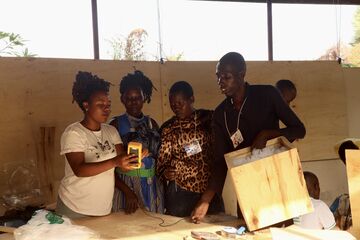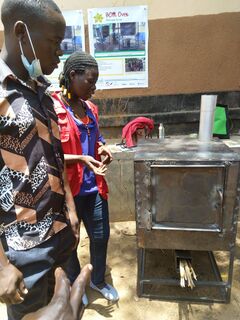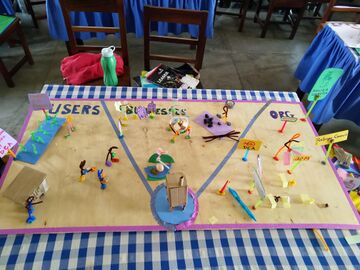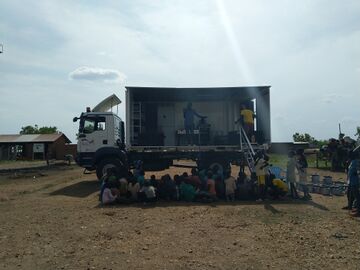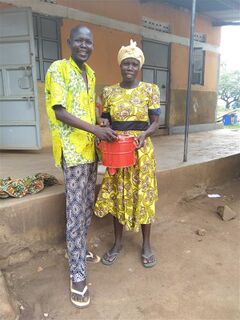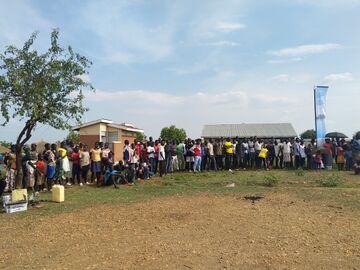How co -creation with communities lead to more sustainable energy access
Context
In partnership with MIT D-Lab, Kulika Uganda and the Youth Social Advocacy Team (YSAT), GIZ’s Energy Solutions for Displacement Settings (ESDS) project supported the establishment of an innovation center in Rhino Camp in Northern Uganda, as well as three Creative Capacity Building (CCB) design trainings with each about 15- 20 participants of the refugee and host community take part. In CCB trainings the participants learn about a design process and how to use tools to build prototypes of technologies that address specific problems that they identify themselves.
The curriculum and methodology has been developed by MIT D-Lab. The activities which are ongoing from May 2021 to August 2022 are part of GIZ’s SUN Energy Solutions for Displacement Settings (ESDS) project commissioned by the German Federal Ministry for Economic Cooperation and Development (BMZ).
The overall goals of the cooperation are to:
- Promote local development of energy solutions by refugee and host communities that are sustainable, scalable, safe, efficient, affordable and culturally appropriate
- Build a better understanding of energy, energy needs, existing products and potential new solutions within the refugee and host communities
- Establish a local innovation eco-system for developing off-grid energy solutions, anchored at the design training center, that encourages innovation in the refugee and host communities.
- Create the means for refugees and host communities to utilize their innovative potential and their local knowledge to design off-grid energy solutions for their energy needs.
- Provide the opportunity, space and materials for people to discover their own innovative capacity
- Foster connections between refugee innovators and NGO actors to raise awareness of refugee-led innovation and promote synergies for meeting refugee energy needs.
- Build a foundation for the continuation of the project.
- Raise awareness and understanding of the CCB and co-creation approach among UNHCR and other humanitarian actors
- Develop a sustainability plan
In order to scale the impact of designed technologies, develop value chains, support productive use of energy and refine technologies a co-creation summit took place.
Co- Creation Summit 13th - 27th March 2022 Arua West Nile
The co- creation summit brought together refugees, host community, humanitarian workers, designers and sector experts to increase the impact of energy technologies developed at CCBs and encourage collaboration between the different actors.
The objectives of this summit was to :
- Achieve proof of concept that refugee/host led Innovation
- Proof that co-design can lead to solutions more culturally and contextually appropriate that can be easily adapted
- Leverage the innovative potential of the refugee and host community to design sustainable energy solutions.
- Develop and test a model that UNHCR could use to promote participatory design in the setting where they work.
The summit targeted participants from the refugee settlements of Rhino, Imvepi and the neighboring host community. Representatives from different organisations such as ZOA, WFP, DCA, Oxfam, YSAT Uganda, Kulika Uganda, Response Innovation Lab and GIZ. Facilitators, design experts and teachers from different backgrounds all over the world, private sector players Including Field ready UK, HAP (Humanitarian Assistance Program) and lifeline fund international.
These vigorously supported the teams in the Creative capacity building design process and the innovation ecosystem, providing refugee targeted project experiences, information gathering, testing, building, refining and model dissemination. The summit was finally crowned by an exhibitions in the settlements showcasing the designed and refined technologies; baking oven, ground nut roaster, wheel cat, washing machine, coolant, and ethanol cookstove.
''It is evident from this exhibition that the technologies showcased today will cause a great impact within the settlements and host communities, as long as funding is channeled into scale up and target both youth and other age groups within the community'' as said by the Assistant Camp Commandant of Rhino Camp.
An article about the summit can be read here.
Whats Next?
The provision of sustainable cooking energy remains certainly one of the big challenge in West Nile, to address this further additional activties are planned and conducted.
- ESDS has supported intensive promotion of improved cookstoves in the settlements in West Nile through Ugandan Cookstove producing companies throughout April 2022. The companies, which are part of the ESDS Result Based Financing Scheme (RBF) could massively improve their sales through public cooking demonstrations, road sales, cooking competitions etc. From 15th May to 14th June 22 MIT D-Lab with Kulika, YSAT and the support of ESDS announce the Month of Cooking in Imvepi and Rhino Camp Settlements. Designing, testing, trainings and showcasing of different improve cooking energy technologies will increase the awareness and knowledge in the settlements, but also help project implementers to understand what cooking energy solutions need to be supported to adress the immense challenge of lacking improved cooking energy in the settlements.
- More work is needed on increasing sustainable supply of biomass cooking fuel (firewood and charcoal) in the settlements. A study on potential solutions can be found here. Concepts for implementation are under development.
Contact
This article is written by Christopher Wepukhulu and *****. Please contact them for further information.
Partners
GIZ's Energy Solutions for Displacement Settings (ESDS) project cooperate with UNHCR to enhance the access to sustainable energy in displacement contexts, and the Energypedia page has been created to share learnings across various practitioners to spur the development of clean energy solutions.


